

“A good traveler has no fixed plans, and is not intent on arriving.”

What Is the Etymological Origin of the Word 'Travel'?

The image above was possibly inspired by "Noel Kempff Mercado National Park," which was itself inspiration for Arthur Conan Doyle's book, 'The Lost World.'
Noel Kempff Mercado National Park
"The Park is dominated by a large tableland of 7000 sq km, the Bolivian side of which is Serrania Huanchaca, and the Brazilian side is Sererania Ricardo Franco. The intervening Rio Verde marks the national boundary. The tableland is bounded by precipitous cliffs, 200 to 700 metres in height. The rocks of the tableland comprise Proterozoic sandstones, deposited around 1 billion years ago, intruded by a tholeiitic sill/dyke complex. These overlie an older basement of granites and metamorphic rocks which crop out over the Amazonic plain. The surface of the tableland is overlain by Cretaceous sandstones, and there are laterites and siliceous duricrusts which mark stages of Tertiary uplift and peneplanation.[8]
The Huanchaca Plateau within the park is 600-900 m above sea level and is composed of Precambrian sandstone and quartzite of the Brazilian Shield."
~ Wikipedia
Getting Where You Want To Go Easily
Travelling today is not only cheap, but also efficient thanks to modern aerospace technologies like the Airbus A350-900, Airbus A340-600, Boeing 777-300ER, and Boeing 747-8.
Getting around however, was historically not so easy to do. The word travel is originally derived from the word 'torture.'
" Travel and travail are doublets - that is to say, they have a common ancestor, but have split into separate words. Their ultimate source is medieval Latin trepalium, a term for an instrument of torture made of three sharp stakes. This was a compound noun formed from Latin tres 'three' and palus 'stake' (source of English pale ). From it was formed a verb trepaliare 'torture on the trepalium, ' hence generally 'torture.' This passed into Old French as travailler, where its reflexive use 'put oneself to pain or trouble' evolved to 'work hard.' Its noun derivative travail 'painful effort, hard work' was borrowed by English as travail, and this quickly developed a new sense, 'journey' (presumably from the notion of a 'wearisome journey'), which came to be distinguished by the spelling travel. "
~ John Ayto, "Dictionary of Word Origins"
Featured Posts

Achieving Alignment Through Communication

Developing Cognitive Ambidexterity

Seventeen Secrets to Living Your Best Life in 2024

Characteristics of a Winner
Similar Posts

What Is the Etymological Origin of the Word 'Gratitude'?

What Is the Etymological Origin of the Word 'Algorithm'?

What Is the Etymological Origin of the Word 'Thing'?
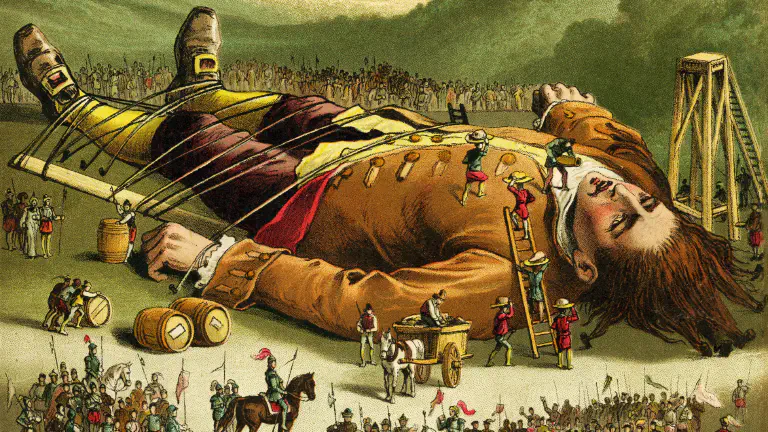
What Is the Etymological Origin of the Word 'Large'?

What Is the Etymological Origin of the Word 'Jean'?

What Is the Etymological Origin of the Word 'Pants?'
Featured Vimeos

Featured Playlists

Recent Posts

What Is the Etymological Origin of the Word 'Start'?

What Is the Etymological Origin of the Word 'Appraisal'?

What Is the Etymological Origin of the Word 'November'?

What Is the Etymological Origin of the Word 'Rush'?
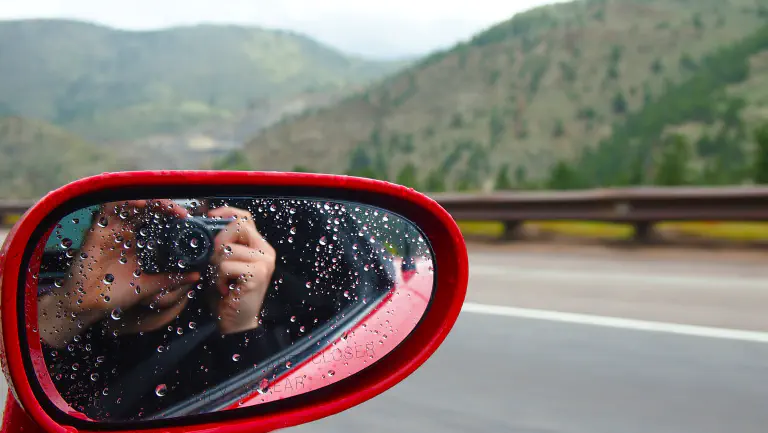
What Is the Etymological Origin of the Word 'Respect'?

What Is the Etymological Origin of the Word 'Team'?

Costco Travel Insurance: Everything You Need to Know

Costco Travel Phone Number: How to Contact Customer Service for Assistance

Costco Travel Deals: How to Save Big on Your Next Vacation

Costco Travel Packages: Affordable Vacation Options for Budget-Conscious Travelers

Is Gate 1 Travel Legit? A Comprehensive Review of the Popular Tour Company

Gate 1 Travel Address: Where to Find the Company’s Headquarters

Gate 1 Travel Customer Service: How to Get Help and Support

Why Is It Called a Travel? Uncovering the Origins of the Word
Traveling has been an essential part of human life for centuries. People travel for various reasons, such as for leisure, business, or education. The word “travel” is derived from the Old French word “travailler,” which means “to work strenuously.” However, the meaning of the word has evolved over time to represent a broader concept of moving from one place to another.
The origin of the word “travel” can be traced back to the Middle Ages when it was used to describe the work of merchants and traders who traveled long distances to trade goods. The term was later adopted by the English language, and its meaning was expanded to include the act of journeying for any purpose. Today, the word “travel” is commonly used to describe the act of going from one place to another, whether it be for work or pleasure.
Despite its evolution over time, the word “travel” remains an essential part of our daily vocabulary. It serves as a reminder of the importance of exploring new places, meeting new people, and experiencing different cultures. In this article, we will explore the history and evolution of the word “travel” and why it has become such an integral part of our lives.
Etymology of ‘Travel’
Table of Contents
Historical Usage
The word ‘travel’ has its roots in the Old French word ‘travail’ which means ‘to work, toil’. In Middle English, the word ‘travailen’ meant ‘to make a journey’. The word ‘travel’ was first used in the English language in the 14th century to refer to the act of making a journey or going on a trip.
In the past, traveling was often associated with work, as people had to travel long distances to conduct trade or engage in other forms of commerce. The word ‘travel’ was used to describe these journeys, which were often arduous and dangerous.
Linguistic Evolution
Over time, the meaning of the word ‘travel’ evolved to encompass a wider range of activities. Today, the word is used to describe any form of movement from one place to another, whether it be for work or pleasure.
The word ‘travel’ is often used interchangeably with other related words such as ‘journey’, ‘trip’, and ‘voyage’. However, each of these words has a slightly different connotation. A ‘journey’ is often used to describe a long, difficult trip, while a ‘voyage’ implies a sea journey. The word ‘trip’ is often used to describe a short, casual journey.
In conclusion, the word ‘travel’ has a rich history and has evolved over time to encompass a wide range of activities. Whether it be for work or pleasure, people have been traveling for centuries and will continue to do so for many years to come.
Cultural Significance
Travel in literature.
Travel has been a popular theme in literature for centuries. From Homer’s Odyssey to Jack Kerouac’s On the Road, travel has been used as a way to explore the human experience and the world around us. In many cases, travel is used as a metaphor for life, with the journey representing the ups and downs that we all experience.
In literature, travel often serves as a means of escape, allowing characters to leave behind their everyday lives and explore new places and experiences. This can be seen in works such as Jules Verne’s Around the World in Eighty Days, where the main character embarks on a journey around the world to win a bet.
Travel in Modern Society
In modern society, travel has become an important part of our lives. With the rise of technology and globalization, it has become easier than ever to travel to different parts of the world. This has led to an increase in tourism, with people traveling for both leisure and business purposes.
Travel has also become a way for people to broaden their horizons and experience different cultures. This can lead to a greater understanding and appreciation of other people and their way of life. In addition, travel can help to break down stereotypes and prejudices by exposing people to different ways of thinking and living.
Overall, travel has a significant cultural significance in both literature and modern society. It allows us to explore the world around us, gain new experiences, and broaden our horizons.
Frequently Asked Questions
What constitutes a traveling violation in basketball.
In basketball, traveling is a violation that occurs when a player moves illegally with the ball. This can happen in a few ways, such as taking too many steps without dribbling the ball, or moving both feet without dribbling after coming to a stop. The exact rules and definitions of traveling can vary depending on the level of play and the league or organization in charge.
How does the gather step relate to traveling rules?
The gather step is a technique used by basketball players to gather the ball and take a step before dribbling or shooting. It is allowed in most situations and is not considered traveling as long as the player does not take more than two steps after the gather. However, the exact rules regarding the gather step can vary depending on the level of play and the organization in charge.
What are the differences in travel rules between the NBA and NCAA?
The rules regarding traveling can vary between different levels of play and different organizations. In general, the NBA tends to have more lenient rules regarding traveling compared to the NCAA. For example, the NBA allows players to take two steps after gathering the ball, while the NCAA only allows one step.
Can a player be penalized for dragging their feet, and is it considered traveling?
Dragging one’s feet is not necessarily considered traveling in basketball, but it can still result in a penalty. If a player drags their feet while changing direction or coming to a stop, it can be considered a violation and result in a turnover or foul. The exact rules regarding dragging one’s feet can vary depending on the level of play and the organization in charge.
Why might referees sometimes not call a travel in professional games?
Referees in professional basketball games may sometimes not call a travel violation if they believe that the player’s movement was legal or if they did not have a clear view of the play. Referees are trained to make split-second decisions and must use their judgment to determine whether a violation has occurred.
What is the maximum number of steps allowed before a layup to avoid traveling?
In general, basketball players are allowed to take two steps after gathering the ball before shooting or laying it up. However, the exact rules regarding the number of steps allowed can vary depending on the level of play and the organization in charge. Players must be careful not to take too many steps, as this can result in a traveling violation and a turnover.
You May Also Like

Disney Travel Agents: Everything You Need to Know

Travel Channel: Your Ultimate Guide to Adventure and Exploration

Japan Travel Guide: Tips and Recommendations for Your Next Adventure
More from author.

+ There are no comments
Cancel reply.
Save my name, email, and website in this browser for the next time I comment.

What Are the Two Types of Trips? A Comprehensive Guide

What is Travel Planning Process? A Clear Guide to Planning Your Next Trip
You may also like:.

Welcome to Pearls of Travel Wisdom
Embark on a journey of discovery with Pearls of Travel Wisdom – your compass in the world of exploration. Immerse yourself in a tapestry of travel tales, budget tips, and financial guides designed to elevate your adventures.
🌍 Explore: Uncover hidden gems and renowned destinations as we share firsthand experiences that go beyond the surface.
💰 Budget Tips: Navigate the world of travel without breaking the bank. Our budget-savvy tips ensure you maximize every adventure without compromising on experiences.
💡 Financial Guides: Demystify the financial aspects of travel. From planning your travel fund to savvy spending on the road, we’ve got you covered.
Join our community of fellow wanderers, where every post is a pearl of wisdom drawn from the richness of our collective journeys. Your next adventure begins here.
Happy exploring!
Muili Muhammed Founder, Pearls of Travel Wisdom
'Vacation': A History
Vacation is perhaps one of the most euphonious words in the English language, if only for the images it evokes: a lazy poolside afternoon, a stroll along cobble-stoned streets, hours of uninterrupted reading in a cozy chair, a day-long trek under a forest canopy, a nap in earshot of lapping waves, a stumbled-upon bookstore full of unread treasures, a perfect morsel consumed while overlooking … uh, sorry about that. We appear to have been distracted for a minute. We'll try to keep to the point here, which is, of course, words, and in this particular case the word vacation itself.

Etymology just living in the moment, only a few phones in sight
Earliest Use of 'Vacation'
It's somewhat comforting, we feel, that it is not a new word. The earliest known example of vacation occurs in Geoffrey Chaucer's 14th century Canterbury Tales , in the famously bawdy (and alarmingly violent) Wife of Bath's Prologue :
And every night and day was his custume, Whan he had leyser and vacacioun From other worldly occupacioun, To reden on this book of wikked wyves.
The Riverside Chaucer translates vacacioun here as "spare time," but in the phrase "vacacioun from other worldly occupacioun" we have a familiar collocation that rings with a still-current meaning of vacation: "a respite or a time of respite from something; intermission." "When he had leisure [=freedom, spare time] and vacation from other worldly occupation" isn't so very different from "when dad/mom gets a vacation from cooking dinner 7 nights a week," despite the centuries between those phrases.
Like so many words that joined the language in the Middle English period, vacation comes from Anglo-French , the particular kind of French spoken in medieval England, and ultimately from Latin: vacātiōn- , vacātiō means "exemption from service, respite from work," and traces back to vacāre , "to be empty, be free, have leisure."
Vacation simmered along in English from the 14th century to the present, developing semantically as one might expect. It took on now-obsolete meanings of "freedom from work or cares" and "time for contemplation," and still-current meanings to do with periods of exemption or suspension from work or activity, and with intermissions in judicial and educational contexts. In the late 19th century, it developed its now most common meaning of "a period spent away from home or business in travel or recreation"—what the British call a " holiday "—and it also got verbed , so that we could talk about "vacationing at the shore."
Other Meaning of Vacation
But there was a point in its history at which it also showed itself to be at the mercy of morphology. You know the word locate ? And how it's got location ? And relate has relation , and translate has translation , and so on? (Note that this pattern is not universal; we have ovations without ovates, invitations without invitates, etc.) Well, in the first half of the 17th century, the lawyerly English-speaking people wanted to use a good, solid Latin-pedigreed word to mean "to make legally void; annul," and they chose vacate , from vacātus . This led to the "act of vacating an order or legal proceeding; annulment" meaning of vacation , and eventually (as vacate developed further) to the "an act or instance of vacating (something, such as an office, post, or house)" meaning of the word. The meanings aren't such a radical departure as one might think though: like vacation , vacate is ultimately from vacāre , which along with meaning "to be empty, be free, have leisure" also means "to annul."
The vacate -related meanings of vacation are far from common, and hardly seem suited to vacations, so we'll stop there and save any further ruminations on them till after we return from ours. That bookstore is calling us.
Word of the Day
See Definitions and Examples »
Get Word of the Day daily email!
Games & Quizzes

Word History
Eavesdrop, fiasco, and 8 more words with surprising origins, funner, stupider, and other words that are in fact real, etymologies for every day of the week, 'ganef,' 'galoot,' and more historical slang terms we love, 14 words inspired by dogs, 12 words for signs of spring, 12 more bird names that sound like insults (and sometimes are), 13 unusually long english words, the words of the week - apr. 26, 9 superb owl words, grammar & usage, primary and caucus: what is the difference, words commonly mispronounced, merriam-webster’s great big list of words you love to hate, more commonly misspelled words, commonly misspelled words.
EtymologyExplorer
- Explore etymologies visually
- Connect new words with familiar ones
- Look at the full dictionary entry to go deep
- Learn more with WOTD notifications
- Save the most interesting words
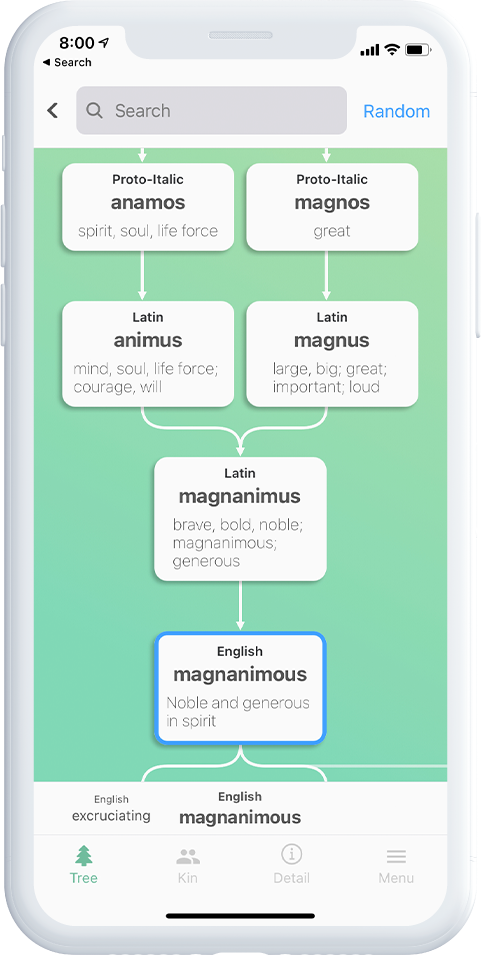
Explore the Etymology Tree
Scroll through thousands of years of language development. Start at a new word, or one you want to explore deeper, then move backwards in time through Latin roots, Ancient Greek words, and Proto-Indo-European reconstructions from 10,000 years ago!
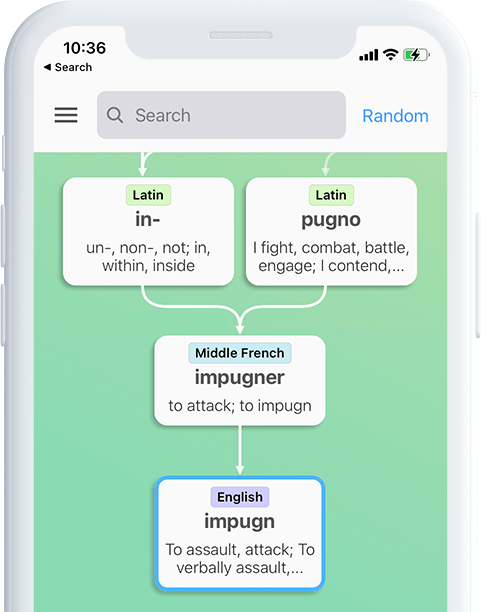
Over 1,400,000 words to explore
With over 1.4M words to explore, you’ll always find that words you’re wondering about, and you’ll never run out of new words to learn. In the English language alone, the app houses 300k words. The rest are spread throughout other languages.
Full detail page
The connections aren’t the only thing interesting. Check out the full details of the word including the part-of-speech, the full written etymology, the pronunciation, definitions for each part of speech, and any descendant words.

Family Explorer
No word is an island, and the Family Explorer helps you uncover the hidden, and sometimes shocking, bridges between cognates. For example, ‘voracious’ is a cousin to ‘carnivore’! Check out millions of relations just like that in the app.
Children Explorer
Words may start with a single meaning, but they expand and morph over time because of the need to explain our increasingly complex world. The Children Explorer shows how root words can give birth to thousands of different meanings in modern language. For instance, Latin ‘gravis’ (“heavy”) is the root of ideas like ‘gravity’, ‘gravid’ (pregnant), and ‘grave’ (serious).
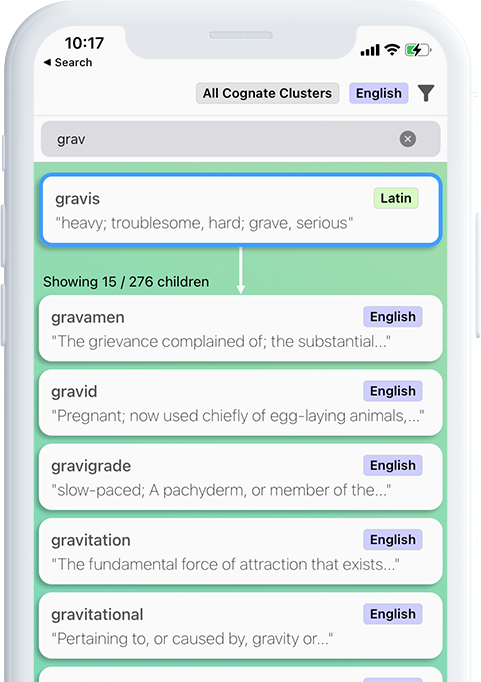
Word of the Day Notifications
Each day get a curated etymology sent directly to your phone. Grow your vocabulary or learn something interested about a word you already knew!
Search over 13k languages
From Ancient Greek, to Tagalog, to Proto-Indo-European, and many more. Search directly in the language using the original script or the transliteration of the word

magnanimous
“mag–NAN–ih–muhs”
Audio & Newspaper Pronunciations
When I started looking up words, the IPA (e.g. “/mæɡˈnæn.ɪ.məs/”) was nearly indecipherable. So I’ve implemented audio and newspaper pronunciations for the majority of words. Now you can understand how to pronounce a word by hearing it, or by reading normal letters, none of the IPA jumble.
Studying for graduate exams nearly crushed me. I couldn’t memorize any vocabulary… until I discovered etymologies.
Learning a word through its connections fits with how my brain works. I grew more and more excited to interpret a word through its roots and cognates (basically a word “cousin”).
But I wanted more than just a sentence describing where a word came from. I wanted a map that traced back through all the known languages of civilization—and then forward to the full array of descendants. One that I could hop around on from node to node and connection to connection.
It didn’t exist—so I created it. That ended up taking many years and a lot of technology (natural language processing, deep learning, cloud computing). I’ve condensed everything down into this app, EtymologyExplorer. I hope you enjoy using it as much as I have.
- Daily Crossword
- Word Puzzle
- Word Finder
- Word of the Day
- Synonym of the Day
- Word of the Year
- Language stories
- All featured
- Gender and sexuality
- All pop culture
- Grammar Coach ™
- Writing hub
- Grammar essentials
- Commonly confused
- All writing tips
- Pop culture
- Writing tips
Advertisement
[ trav - uh l ]
verb (used without object)
to travel for pleasure.
- to move or go from one place or point to another.
- to proceed or advance in any way.
- to go from place to place as a representative of a business firm.
He travels in a wealthy crowd.
- Informal. to move with speed.
- to pass, or be transmitted, as light or sound.
- Basketball. (of a player in possession of the ball) to take more than two steps without dribbling or passing the ball.
- to move in a fixed course, as a piece of mechanism.
verb (used with object)
- to travel, journey, or pass through or over, as a country or road.
We traveled a hundred miles.
to travel logs downriver.
to travel to other planets.
to set out on one's travels.
a book of travels.
- such an account or work.
an increase in travel on state roads.
- Basketball. an instance of traveling with the ball.
- the complete movement of a moving part, especially a reciprocating part, in one direction, or the distance traversed; stroke.
- length of stroke.
to reduce the travel of food from kitchen to table.
a travel alarm clock.
/ ˈtrævəl /
she travelled across France
he travels to improve his mind
he travelled the country
- to go, move, or cover a specified or unspecified distance
to travel in textiles
- (esp of perishable goods) to withstand a journey
the sound travelled for miles
- to progress or advance
- basketball to take an excessive number of steps while holding the ball
- (of part of a mechanism) to move in a fixed predetermined path
that car certainly travels
- informal. often foll by with to be in the company (of); associate
- the act of travelling
a travel brochure
- usually plural a tour or journey
- the distance moved by a mechanical part, such as the stroke of a piston
- movement or passage
Discover More
Spelling note, other words from.
- travel·a·ble adjective
- non·travel·ing adjective
- non·travel·ling adjective
- outtravel verb (used with object) outtraveled outtraveling or (especially British) outtravelled outtravelling
- pre·travel noun verb pretraveled pretraveling or (especially British) pretravelled pretravelling
- un·travel·ing adjective
- un·travel·ling adjective
Word History and Origins
Origin of travel 1
Example Sentences
López said she could not travel to Mexico because she is undocumented.
Sound waves traveling thousands of kilometers through the ocean may help scientists monitor climate change.
Biden traveled to the state days later, meeting with the Blake family and calling for unity and healing in the community, though he, too, denounced the violence that followed the shooting.
TripActions says it has added nearly 500 new corporate customers since March, a surprising achievement at a time when most employees are still not traveling freely.
The Covid-19 coronavirus pandemic, which was first identified in China in December, has had sweeping effects in the public health, business, and travel sectors, among others.
You just travel light with carry-on luggage, go to cities that you love, and get to hang out with all your friends.
He did travel to China and Australia while the story was unfolding.
In doing so he exposed the failure of other airlines in the region to see the huge pent-up demand for cheap travel.
“The tribe is really made of people who put travel as a priority in their entire lifestyle,” says Evita.
Brands like Lo & Sons and Delsey are already tapping Travel Noire to connect with black travelers.
One thing was certain: Grandfather Mole could travel much faster through the water than he could underground.
The mothers know better than any one else how hard a way the little girl will have to travel through life.
He could lie in bed and string himself tales of travel and adventure while Harry was downstairs.
Under ordinary circumstances these men can travel with their burden from twenty to thirty miles a day.
The rules regulating travel on highways in this country are called, "the law of the road."
Related Words
- sightseeing

Origin of Travel
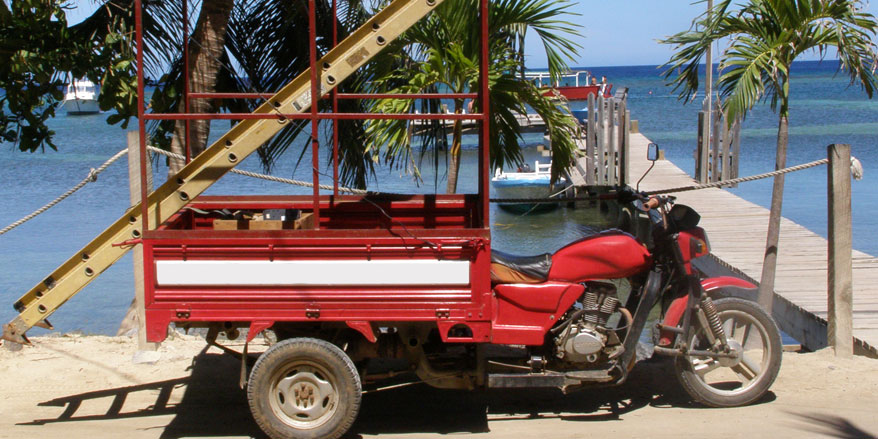
The origin of the word “travel” is most likely lost to history. The term “travel” may originate from the Old French word travail . [3] According to the Merriam Webster dictionary, the first known use of the word travel was in the 14th century. It also states that the word comes from Middle English travailen , travelen (which means to torment, labor, strive, journey) and earlier from Old French travailler (which means to work strenuously, toil). In English we still occasionally use the words travail and travails , which mean struggle. According to Simon Winchester in his book The Best Travelers’ Tales (2004), the words travel and travail both share an even more ancient root: a Roman instrument of torture called the tripalium (in Latin it means “three stakes”, as in to impale). This link reflects the extreme difficulty of travel in ancient times. Also note the torturous connotation of the word “travailler.” Today, travel may or may not be much easier depending upon the destination you choose (i.e., Mt. Everest , the Amazon rainforest ), how you plan to get there ( tour bus , cruise ship , or oxcart ), and whether or not you decide to “rough it (see extreme tourism and adventure travel ). “There’s a big difference between simply being a tourist and being a true world traveler,” notes travel writer Michael Kasum.
- traveler: a person who travels.
- Dictionaries home
- American English
- Collocations
- German-English
- Grammar home
- Practical English Usage
- Learn & Practise Grammar (Beta)
- Word Lists home
- My Word Lists
- Recent additions
- Resources home
- Text Checker
Definition of travel verb from the Oxford Advanced American Dictionary
Join our community to access the latest language learning and assessment tips from Oxford University Press!
- 3 [ intransitive ] ( of food, wine, an object, etc. ) to be still in good condition after a long trip Some wines do not travel well.
- 4 [ intransitive ] to go fast Their car can really travel!
- 5 [ intransitive ] ( in basketball ) to move while you are holding the ball, in a way that is not allowed compare dribble

Other results
- travel light
Nearby words
Beyond Wanderlust: 30 Words Every Traveler Should Know
By emily petsko | jun 13, 2022, 5:14 pm edt.

For those who travel, wanderlust is a familiar feeling. It’s that nagging voice in your head that says, “Yes, you do need to book that flight,” even if your bank account says otherwise. Regardless of how many passport covers this word may adorn, it doesn’t begin to cover the spectrum of emotions and experiences that can be revealed through the act of travel. Here are 30 travel words from around the world to keep in your back pocket as you're exploring this summer.
From the Latin vagari , meaning “to wander,” this 16th-century word originally meant a wandering journey . Nowadays, "vagaries" refer to unpredictable or erratic situations, but that doesn’t mean the old sense of the word can’t be invoked from time to time.
2. Selcouth
An Old English word that refers to something that’s both strange and marvelous . It's a great way to sum up those seemingly indescribable moments spent in an unfamiliar land.
Who hasn’t felt a strong desire to be somewhere—anywhere—other than where you currently are? That’s fernweh , or “ farsickness ," and this German word has been described as a cousin of wanderlust, another German loan word.
4. Dépaysement
Anyone who has traveled abroad will recognize this feeling. The French word refers to the sense of disorientation that often sets in when you step outside your comfort zone, such as when you leave your home country.
Another gift from the French, this word literally translates to “drift,” but thanks to some mid-20th century French philosophers, it can also refer to a spontaneous trip , completely free of plans, in which you let your surroundings guide you.
6. Peregrinate
To peregrinate is to travel from place to place, especially on foot. Its Latin root, peregrinus (meaning “foreign”), is also where the peregrine falcon (literally “ pilgrim falcon ”) gets its name.
7. Perambulate
Similar to peregrinate, this word essentially means to travel over or through an area by foot. So instead of saying that you’ll be walking around London, you can say you’ll be perambulating the city’s streets—much more sophisticated.
8. Numinous
This English word could appropriately be used to describe the Grand Canyon or the Northern Lights. Something numinous is awe-inspiring and mysterious. It's difficult to understand from a rational perspective, which gives it a spiritual or unearthly quality.
9. Peripatetic
The young and the restless will want to incorporate this word into their lexicon. The adjective refers to those who are constantly moving from place to place—in other words, a nomadic existence. It stems from the Greek word peripatein (“to walk up and down”), which was originally associated with Aristotle and the shaded walkways near his school (or, according to legend, his habit of pacing back and forth during lectures).
10. Waldeinsamkeit
You’re alone in a forest. It’s peaceful. The sun is filtering through the trees and there’s a light breeze. That’s waldeinsamkeit . (Literally "forest solitude." And yes, Germans have all the best travel words.)
11. Shinrin-Yoku
In a similar vein, this Japanese word means “ forest bathing ,” and it's considered a form of natural medicine and stress reliever. There are now forest bathing clubs around the world, but you can try it out for yourself on your next camping trip. Take deep breaths, close your eyes, and take in the smells and sounds of the forest. Simple.
12. Solivagant
In those moments when you just want to run away from your responsibilities, you may consider becoming a solivagant : a solo wanderer .
13. Yoko Meshi
This Japanese phrase literally translates to “ a meal eaten sideways ,” which is an apt way to describe the awkwardness of speaking in a foreign language that you haven’t quite mastered, especially over dinner.
14. Resfeber
You just booked your flight. Your heart starts racing. You’re a little nervous about your journey, but mostly you just can’t wait to get going. The anticipation, anxiety, and excitement you get before a big trip is all rolled into one word— resfeber —and you can thank the Swedes for it.
15. Flâneur
Taken from the French flâner , meaning to stroll or saunter , this word describes someone who has no particular plans or place they need to be. They merely stroll around the city at a leisurely pace, taking in the sights and enjoying the day as it unfolds.
16. Gadabout
This could be construed as the traditional English equivalent of flâneur . Likely stemming from the Middle English verb gadden , meaning “to wander without a specific aim or purpose,” a gadabout is one who frequently travels from place to place for the sheer fun of it. In other words: a modern-day backpacker.
17. Hiraeth
Sometimes, no matter how amazing your vacation may be, you just want to come home to your bed and cats. This Welsh word sums up the deep yearning for home that can strike without warning. As Gillian Thomas put it in an interview with the BBC , “Home sickness is too weak. You feel hiraeth , which is a longing of the soul to come home to be safe.”
This Japanese word can be taken to mean “graceful elegance” or “subtle mystery,” but it’s much more than that. It's when the beauty of the universe is felt most profoundly, awakening an emotional response that goes beyond words.
19. Schwellenangst
Translating to “ threshold anxiety ,” this German word sums up the fears that are present before you enter somewhere new—like a theater or an intimidating cafe—and by extension going anywhere unfamiliar. The fear of crossing a threshold is normal, even among the most adventurous of travelers—but it often leads to the most unforgettable experiences.
20. Commuovere
Have you ever seen something so beautiful it made you cry? That’s commuovere in action. The Italian word describes the feeling of being moved, touched, or stirred by something you witness or experience.
This Danish word refers to a warm feeling of contentedness and coziness, as well as the acknowledgment of that feeling. Although not explicitly related to this term, author Kurt Vonnegut summed up the idea behind this concept quite nicely when he said, “I urge you to please notice when you are happy, and exclaim or murmur or think at some point, 'If this isn't nice, I don't know what is.'"
22. Hanyauku
Here's one for those who have a beach trip coming up. Taken from Kwangali, a language spoken in Namibia, hanyauku is the act of tiptoeing across hot sand.
23. Smultronställe

This Swedish word translates to something along the lines of “place of wild strawberries,” but its metaphorical meaning is something along the lines of a "happy place." Whether it’s a hidden overlook of the city or your favorite vacation spot that hasn’t been “discovered” yet, smultronställe refers to those semi-secret places you return to time and time again because they’re special and personal to you.
24. Dustsceawung
This Old English word describes what might happen when you visit a place like Pompeii or a ghost town. While reflecting on past civilizations, you realize that everything will eventually turn to dust. A cheery thought.
25. Vacilando
In some Spanish dialects, the word vacilando describes someone who travels with a vague destination in mind but has no real incentive to get there. In other words, the journey is more important than the destination. As John Steinbeck described it in his travelogue Travels With Charley : “It does not mean vacillating at all. If one is vacilando , he is going somewhere, but doesn't greatly care whether or not he gets there, although he has direction. My friend Jack Wagner has often, in Mexico, assumed this state of being. Let us say we wanted to walk in the streets of Mexico city but not at random. We would choose some article almost certain not to exist there and then diligently try to find it.”
26. Lehitkalev
Backpackers and budget travelers, this one is for you: The Hebrew word lehitkalev translates to “dog it” and means to deal with uncomfortable living or travel arrangements.
27. Komorebi
This beautiful Japanese word is a good one to save for a sunny day spent in the woods. Komorebi translates to “sunshine filtering through the leaves.” Does it get any lovelier than that?
This Balinese word refers to something that is simultaneously chaotic and joyful. It isn’t specifically a travel word, but it does seem to fit the feelings that are often awakened by travel.
29. Trouvaille
Translating to a “lucky find,” this French word can be applied to that cool cafe, flower-lined street, or quirky craft store that you stumbled upon by chance. Indeed, these are the moments that make travel worthwhile.
30. Ullassa
Just in case you needed another reason to plan that trip to Yosemite, here's one last word for nature lovers. The Sanskrit word ullassa refers to the feelings of pleasantness that come from observing natural beauty in all its glory.
A version of this story ran in 2018; it has been updated for 2022.
Learn the Multicultural Roots of These Travel Words
We may not be traveling as much as usual this summer, but that doesn't mean we can't fantasize a little and plan for future adventures. Will you go on holiday? Take a staycation? Even if you're just driving to the country, there's a word for you. Not surprisingly, some of our favorite travel words come from different cultures. Pick your favorite and start planning your itinerary.
If you’re traveling for business or pleasure, chances are you’re going on a trip. Derived from the Middle Dutch trippen , meaning "to skip or hop," "trip" is an apt choice to describe a short or temporary excursion.
Although "trip" and "vacation" are generally interchangeable, if a trip is a short travel experience, a vacation usually refers to a longer break. It stems from the Latin vacare , meaning "to be (blissfully!) unoccupied."
In North American English, "holiday" is usually associated with its origin: the Old English hāligdæg , meaning holy day. Not all holidays are religious, of course, but we're still honoring someone or something. In British English, however, "holiday" is usually interchangeable with "vacation," as in, “We’re going on holiday in France.”
This elegant word refers to a short stay. While the jour comes from the French word for "day," the traditional roots of this word are the Latin terms sub , meaning "under," and diurnum , "day." It's perfect for describing a quick trip or layover as part of a longer journey.
Another name for short recreational jaunts, this Latin-inspired word comes from ex , meaning "out," and currere , "to run." In modern English, people might use the word "excursion" for something as simple as a trip to the grocery store, but its traditional application was related to travel.
The opposite of an excursion in many ways, an expedition is a longer trip that’s taken for a specific purpose such as research, science, exploration, or war. It comes from the Latin expeditio , meaning "to set out with aggressive intent."
While many words for travel are inspired by leisure, treks are defined by work. You might associate treks with traveling on foot, thanks to the early 19th-century South African Dutch roots in the word trekken .
Globe-trotters — much like the Harlem-based exhibition basketball team of the same name — are impressive travelers, frequently journeying around the world. Globe-trotting essentially means you’re stamping your passport more times than there’s pages, as in, “They’re home for the winter after globe-trotting through Europe.”
If you’re traveling by sea, you can say you're going on a voyage. Voyages are generally considered longer, possibly even arduous trips. The word derives from the Latin viaticum , referring to provisions for a long journey.
"Journey" stems from the Old French term jornee , meaning "a day’s travel" or "a day’s work." Any jet-lagged traveler will tell you it’s been a journey to get to their destination.
Staying in a place is one thing; immersing yourself in it is another. For the latter, you might use the word "tour" to describe your adventures. "Tour" — from an Old French word of the same spelling, meaning "turn" — is also the preferred choice for describing a multi-stop travel experience. "Sightsee" has a similar definition and refers to seeing the landmarks and attractions a destination has to offer.
This word is often associated with an animal-focused travel experience in Africa. The origin is Arabic, s afara , which the Swahili people use to describe traveling in general.
Traditionally, this term referred to a pilgrim’s journey on a religious mission. Today we use "pilgrimage" for a trip where the destination is significant on a personal or global level. For example, one might take a pilgrimage to their ancestors’ birthplace, a revered monument, or a holy ground.
This term was coined by a New York reporter in the 1950s to describe the wealthy folk known for their international travel. Today "jet-set" also is used as a verb to describe the act of enjoying high-end, enviable, or luxurious travel experiences — as in, “She’s jet-setting around the globe for work.”
Sometimes travel words are all about where you’ll end up — as in "camp" or "staycation." Other times, the season of the year is more significant. If you have large chunks of time, but you don't want to globe-trot, jet set, or trek, you might want to pick a destination at which to summer — or winter. For some reason, "autumn" and "spring" don't get the same treatment.
Photo credit: Charlie Costello / Unsplash
- Skip to Content
- Skip to Footer
Please enable JavaScript for this site to work properly.
Take the "Trans" Train
trans-across
Quick Summary
Prefixes are key morphemes in English vocabulary. The prefix trans- and its variant tra- , which mean “across,” appear in many English vocabulary words, for example: trans mit, trans form, and tra jectory. Consider the word trans lation, which is the carrying “across” from one language into another.
Today we will focus on the prefix trans- and its variant tra- , which mean “across.” Prefixes are morphemes which begin words, attaching to a word’s main part, or root, adding to the meaning of the word in some way.
The carrying “across” of people from one place to another is trans portation, which can occur in many kinds of vehicles. When you trans fer money from checkings to savings, you carry it “across” from one account to the other. A trans lucent substance allows some light to go “across” it to the other side. A trans parent substance allows all light to go “across” it. And a trans lation? It is a going “across” from one language into another.
Imagine a trans atlantic voyage, or one that goes “across” the Atlantic Ocean, made by a ship. This form of trans it, or going “across” a passage, was once more common than it is now. When horrific storms came up on these long journeys, voyagers could often be trans formed, their normal mode of behavior taken “across” into whole new forms of heroism and survival techniques.
A variant of the prefix trans- , tra- , also means “across.” A tra jectory is the path that a thrown object travels “across” during its journey. When you tra verse a country, you travel “across” it. And when you tra duce someone’s character, you lead it from its current good state “across” to one of dishonor or disgrace.
Now you will be able to trans late any word that you do not know with the prefix trans- in it into something having to do with going or being “across!”
- transportation : act of carrying ‘across’
- transfer : carry ‘across’
- translucent : of light going ‘across’
- transparent : of light going fully ‘across’
- translate : carry one language ‘across’ to another
- transatlantic : ‘across’ the Atlantic Ocean
- transit : a going ‘across’
- transform : to go from one shape ‘across’ to another
- trajectory : path thrown ‘across’
- traverse : turn ‘across’
- traduce : lead ‘across’
Related Rootcasts
The fascinating parts of words.
Morphology is the study of how words are put together by using morphemes, which include prefixes, roots, and suffixes. Parsing the different morphemes in a word reveals meaning and part of speech. For instance, the word “invention” includes the prefix in- + the root vent + the suffix -ion , from which is formed the noun “invention.”
Etymology: Word Origins
Etymology is that part of linguistics that studies word origins. English vocabulary words are formed from many different sources, especially Latin and Greek. By determining the origins of the morphemes in English words, one is better able to remember and determine the dictionary definitions of words.
Differentiated vocabulary for your students is just a click away.
We use cookies! 🍪
We use cookies to provide you with the best online experience. By using this site, you agree to our privacy policy and terms of use .
Get Started
Hi there! Tell us a little bit about yourself to begin.
I'm an educator
looking to use Membean at my school or district.
I'm a parent
looking for my kid(s) to use Membean.
I'm interested in: Select... Homeschooling Independent Learning
I'm an individual
wanting to study for a test or to improve my vocabulary.
I'm studying for: Select... SAT GRE Personal Use

War History Online
Most People Don't Know These 11 Everyday Phrases Originated in the Navy
Posted: April 30, 2024 | Last updated: April 30, 2024

Most People Don’t Know These 11 Everyday Phrases Originated in the Navy
Throughout history, sailors have developed a distinct vocabulary to describe the unique facets of their world, covering everything from objects and individuals to actions and locations. Interestingly, a significant portion of this maritime jargon has made its way into the English language, often escaping the notice of the general public, who remain unaware of its nautical origins.
If you're intrigued by the maritime roots of these commonplace expressions, read on!

Ships husband
When a ship is heading back to port for repairs, a sailor might colloquially mention that the vessel is returning to her "husband." In this context, "husband" denotes the person in charge of the shipyard who's responsible for restoring the ship to operational condition.

In through the hawsepipe
"In through the hawsepipe" is a naval colloquialism employed by sailors who achieve officer status through unconventional pathways, symbolizing their journey through the hierarchical ranks of a ship.
In this particular context, it signifies commencing at the lowest rung. The hawsepipe - or hawsehole - refers to the opening in the ship's bow through which the anchor cable is threaded.

Let the cat out of the bag
"Letting the cat out of the bag" describes the punishment of whipping in the Navy.
The term "cat" points to the cat o' nine tails, a formidable whip with multiple tails that's typically kept within a cloth bag. Sailors were aware that this punishment was imminent when the superior administering the discipline extracted the whip from its bag.
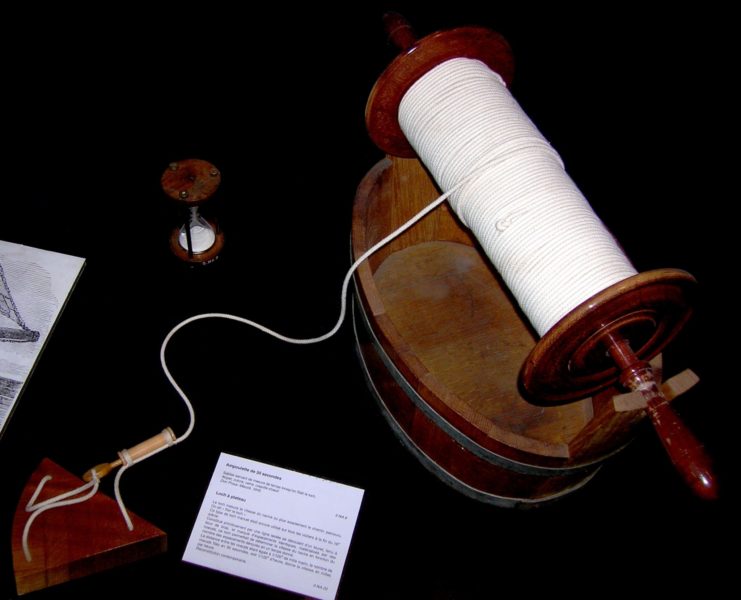
A knot serves as a universally recognized unit for measuring speed through water. Its origins lie in the method sailors employed to gauge a ship's velocity. A length of rope was marked with colored knots at intervals of 47.33 feet. Attached to one end was a piece of wood that floated in the water, allowing the rope to uncoil as the ship progressed.
By counting the number of knots slipping through a sailor's fingers within a 28-second span, the vessel's speed could be determined.

Scuttlebutt
Within naval circles, "scuttlebutt" is a stand-in for gossip or rumor. Its roots lie in "scuttle," the act of intentionally sinking a vessel by piercing holes in its hull, and "butt," the cask where sailors would gather to chat. Essentially, it symbolizes the way rumors can affect morale, much like water seeping into a ship.
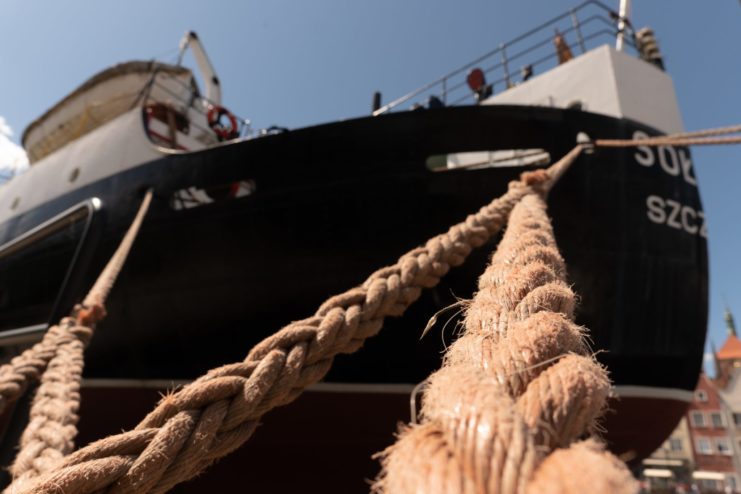
He knows the ropes
Initially used to describe a novice sailor, this term has become part of the English language. It was marked on their discharge papers, indicating their proficiency with the ropes on a ship - a fundamental aspect of seamanship.
Essentially, it reassured their superiors that they understood the basics of sailing.

Spinning a yarn
In modern use, "to spin a yarn" denotes storytelling, often with a touch of exaggeration. Its maritime roots trace back to naval officers who feared excessive storytelling among sailors would hinder productivity.
Typically, a ship's crew would unwind old ropes, a task allowing ample time for conversation and storytelling, dubbed "spinning yarns." Over time, this evolved into the phrase for recounting an elaborate tale.

Devil to pay
This expression is used today to describe that something unwanted is looming. However, some claim the term originates from the despised task of waterproofing a wooden ship's longest seam along the keel. This is sometimes disputed, but there are many who believe it.
The seam was named the "devil" and would be "paid" or covered by tar. Paying the devil was an extremely unpleasant and difficult job, and the name was eventually used to describe any unwanted situation.
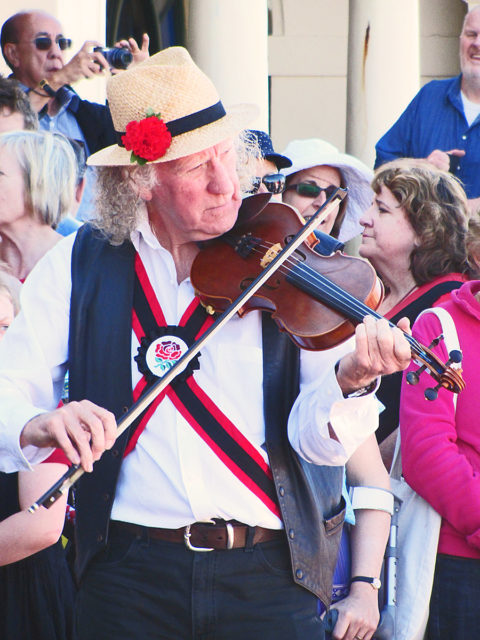
On the fiddle
The fiddle was a raised lip around the edge of a sailor's plate. If food touched it, this meant he had too much and was described as being "on the fiddle." This could earn him a whipping.
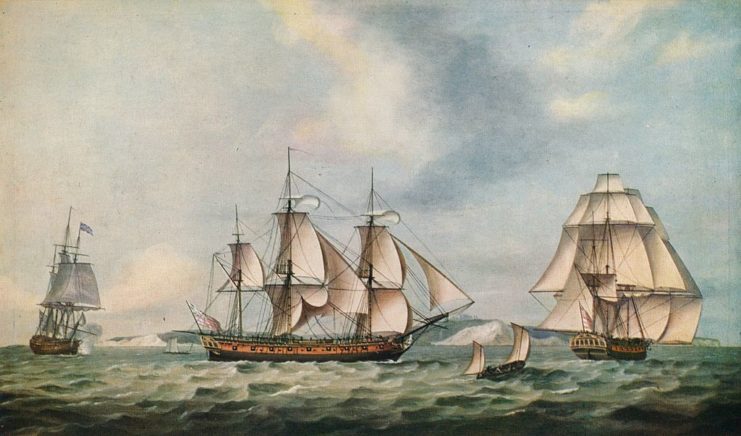
A sailor may say the word bokoo, meaning "many." This actually comes from the French word, beaucoup , which has the same meaning. The spelling was simplified over time and is an example of the many words from other languages that have been incorporated into Navy slang when traveling the world.
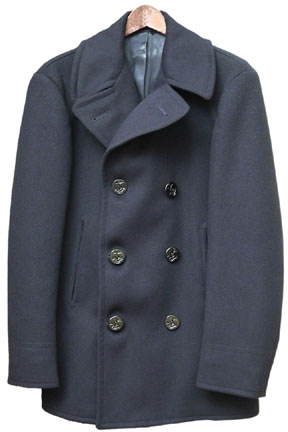
Are you a fan of all things ships and submarines? If so, subscribe to our Daily Warships newsletter!
A peacoat is a thick jacket worn by sailors during bad weather. A potential origin for the name comes from the material from which it's made, pilot cloth. Sailors would refer to the coarse, heavy fabric with the initial "P," instead of pilot, which eventually became the "pea" in peacoat.
More for You
29 common human foods you may not realize are poisonous to your dog
Former world champion boxer Timothy Bradley predicts Mike Tyson will knock out Jake Paul in upcoming bout
Defending champion Denver Nuggets advance in playoffs as Jamal Murray game-winner downs Los Angeles Lakers
This humanoid robot currently holds the world record for speed
Restaurants Should Be Able to Rate Customers, Too
'American Idol': Watch Emmy Russell bring Katy Perry to tears with touching Loretta Lynn cover
Joe Biden proposes hitting Donald Trump with a $1 billion tax bill
Off the Mark by Mark Parisi
The Best 27 Red Carpet Moments of the '70s
Whoopi Goldberg hits media for anti-Israel protest coverage: 'Be very careful'
The #1 restaurant chain in America, according to diners—and see the rest of the top 50
‘American Idol' Remembers Mandisa With Emotional Tribute By Alum Colton Dixon, Melinda Doolittle & Danny Gokey
Zendaya's Baby Pink Tennis Polo Dress Includes Cutouts That Hit Her Hip Bone
Professor Allan Lichtman's 2024 presidential pick
This type of supplement may increase heart disease risk, new study finds
Stephen A. Smith's TOP 5 Reasons Michael Jordan Is The GOAT Over LeBron James
We Tried And Ranked 17 Of The Best Frozen Pizzas And The Winner Had Us Shook
Watch: 'Jurassic World: Chaos Theory' trailer kills off Jenna Ortega's Brooklynn
Contestant makes history as first Miss Delaware Teen USA with Down syndrome
Jim Parsons Teases ‘Big Bang Theory's Character Reprisal Ahead Of ‘Young Sheldon' Series Finale
This Is the Best Airport in the World, According to a New Ranking
By Hannah Towey

Hamad International Airport (HIA) in Qatar was just named the best airport in the world in the 2024 Skytrax awards, knocking 12-time winner Singapore Changi Airport down to second place.
The annual ranking is based on customer satisfaction surveys of over 500 airports, evaluating factors such as cleanliness, friendliness of airport staff, the ease of getting to and from the airport, terminal design, dining options, and more.
Hamad International Airport first opened in 2014, replacing the adjacent Doha International Airport as Qatar's main aviation hub. The airport is operated by Qatar Airways, which is consistently ranked one of the best international airlines in the Condé Nast Traveler Reader's Choice Awards , and is the only airport designed specifically for the Airbus A380 plane. This year marks the third time the airport has won the prestigious industry award.
So, what exactly sets the airport apart from the competition? One of its newest—and most ambitious—features is the “Orchard,” a 6,000-square-meter indoor tropical garden with 65 retail and dining venues launched in 2022 as part of a multi-year expansion project. Home to over 300 trees and 25,000 plants from sustainable forests around the world, it's one of the airport's many green initiatives that includes a waste management program that recycles 3,979 tons of organic compost per year to be used as fertilizer.
“Throughout our young history, we have continued to showcase our commitment to environmental sustainability–from improving carbon efficiency to reducing greenhouse gas emissions and managing wastewater," Michael McMillan, the airport's vice president of facilities management said in a 2022 news release . “Sustainability has proudly been at the forefront of what we do since our inception.”
Over the past couple years, the airport has also added a brand-new airport hotel, Oryx Garden Hotel, as well as four new airport lounges, including the glamorous Louis Vuitton Lounge . In addition to Louis Vuitton, the airport's massive retail center Qatar Duty Free has an entire “street” called Viale del Lusso devoted to luxury shops like Dolce&Gabbana, Jimmy Choo, and Valentino. It perhaps comes at no surprise then that the airport also won Skytrax's 2024 award for the world’s best airport shopping.

The Louis Vuitton Lounge by Yannick Alléno in Doha's Hamad International Airport.

Chef Yannick Alléno highlights local ingredients, French favorites, and international fare.
The airport served over 45 million passengers in 2023, a 31% increase compared to the previous year, surpassing the previous record set during the FIFA World Cup. HIA has also added new international airline partners, including Vistara, Iberia, Xiamen Airlines, Garuda Indonesia, and Japan Airlines, and serves over 250 destinations. The airport's rapid growth shows now signs of stopping: the second phase of the expansion, scheduled to begin in 2023, aims to expand the airport's capacity to over 70 million annual passengers.
“Our continuous investment in our facilities and pioneering initiatives in retail and hospitality within a single expansive terminal has made this achievement possible," Badr Mohammed Al-Meer, the CEO of Qatar Airways Group, said in a news release . "We have introduced a diverse range of experiences at the airport, including ‘Souq Al Matar’, which brings Qatari hospitality and culture closer to travelers; ‘Orchard’, the ideal place for relaxation and rejuvenation between flights; and an array of high-end lounges.”
Other standout winners in the 2024 Skytrax airport awards include Seoul's Incheon Airport, the world’s most family friendly airport; Tokyo's Haneda Airport, the world’s cleanest airport; and the Istanbul Airport, for the world’s best airport dining experience.
Below, see the world's best airports , according to the 2024 Skytrax World Airport Awards. How many have you been to?
The World’s Top 20 Airports for 2024
- Doha Hamad Airport
- Singapore Changi Airport
- Seoul Incheon Airport
- Tokyo Haneda Airport
- Tokyo Narita Airport
- Paris Charles de Gaulle Airport
- Dubai Airport
- Munich Airport
- Zurich Airport
- Istanbul Airport
- Hong Kong Airport
- Rome Fiumicino Airport
- Vienna Airport
- Helsinki-Vantaa
- Madrid-Barajas
- Centrair Nagoya Airport
- Vancouver Airport
- Kansai Airport
- Melbourne Airport
- Copenhagen Airport
By signing up you agree to our User Agreement (including the class action waiver and arbitration provisions ), our Privacy Policy & Cookie Statement and to receive marketing and account-related emails from Traveller. You can unsubscribe at any time. This site is protected by reCAPTCHA and the Google Privacy Policy and Terms of Service apply.
Press Herald
Account Subscription: ACTIVE
Questions about your account? Our customer service team can be reached at [email protected] during business hours at (207) 791-6000 .
- Arts & Entertainment
Calling all Swifties: Take our quiz and see photos of the star in Kennebunkport in 2010
Prove your fandom with our trivia questions.

You are able to gift 5 more articles this month.
Anyone can access the link you share with no account required. Learn more .
With a Press Herald subscription, you can gift 5 articles each month.
It looks like you do not have any active subscriptions. To get one, go to the subscriptions page .
Loading....

Singer-songwriter Taylor Swift released her 11th album, “The Tortured Poets Department,” on April 19, and the response to it just about broke the internet (along with a streaming record).
During all of the excitement, we unearthed a trove of Press Herald photos of Swift from when she visited Kennebunkport in 2010 for a special outdoor performance.
Check out these sensational images from staff photographer Derek Davis and then try your luck at our Taylor Swift quiz!
Success. Please wait for the page to reload. If the page does not reload within 5 seconds, please refresh the page.
Enter your email and password to access comments.
Forgot Password?
Don't have a commenting profile? Create one.
Hi, to comment on stories you must create a commenting profile . This profile is in addition to your subscription and website login. Already have a commenting profile? Login .
Invalid username/password.
Please check your email to confirm and complete your registration.
Create a commenting profile by providing an email address, password and display name. You will receive an email to complete the registration. Please note the display name will appear on screen when you participate.
Already registered? Log in to join the discussion.
Only subscribers are eligible to post comments. Please subscribe or login first for digital access. Here’s why .
Use the form below to reset your password. When you've submitted your account email, we will send an email with a reset code.
Send questions/comments to the editors.
Member Log In
Please enter your username and password below. Already a subscriber but don't have one? Click here .
Not a subscriber? Click here to see your options

travelogue (n.)
"a talk on travel," 1903, a hybrid word coined by U.S. traveler Burton Holmes (1870-1958) from travel + Greek-derived -logue , abstracted from monologue .
Entries linking to travelogue
1660s, "long speech by one person, scene in a drama in which a person speaks by himself," from French monologue , from Late Greek monologos "speaking alone or to oneself," from Greek monos "single, alone" (from PIE root *men- (4) "small, isolated") + logos "speech, word," from legein "to speak," from PIE root *leg- (1) "to collect, gather," with derivatives meaning "to speak (to 'pick out words')." Related: Monologist .
late 14c., "to journey," from travailen (1300) "to make a journey," originally "to toil, labor" (see travail ). The semantic development may have been via the notion of "go on a difficult journey," but it also may reflect the difficulty of any journey in the Middle Ages. Replaced Old English faran . Related: Traveled ; traveling . Traveled (adj.) "having made journeys, experienced in travel" is from early 15c. Traveling salesman is attested from 1885.
Trends of travelogue
More to explore, share travelogue.
updated on September 28, 2017
Trending words
- 1 . vegetable
- 6 . encampment
- 7 . engineer
- 10 . testimony
Dictionary entries near travelogue
Traviata, La
- English (English)
- 简体中文 (Chinese)
- Deutsch (German)
- Español (Spanish)
- Français (French)
- Italiano (Italian)
- 日本語 (Japanese)
- 한국어 (Korean)
- Português (Portuguese)
- 繁體中文 (Chinese)

IMAGES
VIDEO
COMMENTS
travel. (v.) late 14c., "to journey," from travailen (1300) "to make a journey," originally "to toil, labor" (see travail ). The semantic development may have been via the notion of "go on a difficult journey," but it also may reflect the difficulty of any journey in the Middle Ages. Replaced Old English faran.
1. "travel (v.) late 14c., "to journey," from travailen (1300) "to make a journey," originally "to toil, labor" (see travail). The semantic development may have been via the notion of "go on a difficult journey," but it also may reflect the difficulty of any journey in the Middle Ages. Replaced Old English faran."
The etymological origin of the word travel is torture; these days, travel is anything but. Modern planes, like , make travelling to incredible destinations around the world, cost effective, people friengly, and fun. On October 1st, 2022, in North America, winter is coming. Now is as good a time as any to plan a trip to South America. Contact travel agency now.
Etymology. The origin of the word "travel" is most likely lost to history. The term "travel" may originate from the Old French word travail, which means 'work'. According to the Merriam-Webster dictionary, the first known use of the word travel was in the 14th century. It also states that the word comes from Middle English travailen, travelen (which means to torment, labor, strive, journey ...
Embark on a captivating linguistic journey as we delve into the origins and evolution of the word 'Travel.' Discover the fascinating history and cultural ins...
Tremendous thanks and appreciation to all of you. The online etymology dictionary (etymonline) is the internet's go-to source for quick and reliable accounts of the origin and history of English words, phrases, and idioms. It is professional enough to satisfy academic standards, but accessible enough to be used by anyone.
The word 'travel' has its roots in the Old French word 'travail' which means 'to work, toil'. In Middle English, the word 'travailen' meant 'to make a journey'. The word 'travel' was first used in the English language in the 14th century to refer to the act of making a journey or going on a trip.
Well, in the first half of the 17th century, the lawyerly English-speaking people wanted to use a good, solid Latin-pedigreed word to mean "to make legally void; annul," and they chose vacate, from vacātus. This led to the "act of vacating an order or legal proceeding; annulment" meaning of vacation, and eventually (as vacate developed further ...
Over 1,400,000 words to explore. With over 1.4M words to explore, you'll always find that words you're wondering about, and you'll never run out of new words to learn. In the English language alone, the app houses 300k words. The rest are spread throughout other languages.
Learning about the building blocks of words can help you make sense of unfamiliar words.
Function: verb. Inflected Form (s): trav·eled or trav·elled ; trav·el·ing or trav·el·ling tra-və-liŋ, trav-liŋ. Etymology: Middle English travailen, travelen to torment, labor, strive, journey, from Anglo-French travailler. Date: 14th century. Please note the Etymology - Travel is a close sibling to the French word Travail ...
Travel definition: to go from one place to another, as by car, train, plane, or ship; take a trip; journey. See examples of TRAVEL used in a sentence.
journey. (n.). c. 1200, "a defined course of traveling; one's path in life," from Old French journée "a day's length; day's work or travel" (12c.), from Vulgar Latin * diurnum "day," noun use of neuter of Latin diurnus "of one day" (from dies "day," from PIE root *dyeu-"to shine"). The French fem, suffix -ée, from Latin -ata, was joined to nouns in French to make nouns expressing the ...
travel sickness; a travel bag/clock (= for use when travelling) a travel guide (= a book of useful information for travellers) If you're going abroad, get some travel insurance. your passport and other travel documents; The pass allows unlimited travel on all public transport in the city. I used my compass to confirm my direction of travel.
The origin of the word "travel" is most likely lost to history. The term "travel" may originate from the Old French word travail.[3] According to the Merriam Webster dictionary, the first known use of the word travel was in the 14th century. It also states that the word comes from Middle English travailen, travelen (which means to torment, labor, strive, journey) and …
definition 1: to journey from place to place. Many people like to travel during their vacations, but others prefer to stay home. I've traveled a lot in North America, but I've never traveled to other continents. synonyms: go, journey, tour. similar words: cruise, fly, junket, roam, rove, sightsee, trek, visit, voyage. definition 2:
1 [intransitive, transitive] to go from one place to another, especially over a long distance to travel around the world I go to bed early if I'm traveling the next day. I love traveling by train. We always travel first class. We traveled to California for the wedding. When I finished college I went traveling for six months (= spent time visiting different places). travel something He traveled ...
1. Vagary. From the Latin vagari, meaning "to wander," this 16th-century word originally meant a wandering journey. Nowadays, "vagaries" refer to unpredictable or erratic situations, but that ...
While the jour comes from the French word for "day," the traditional roots of this word are the Latin terms sub, meaning "under," and diurnum, "day." It's perfect for describing a quick trip or layover as part of a longer journey. ... While many words for travel are inspired by leisure, treks are defined by work. You might associate treks with ...
A root word is the fundamental unit of a word. A root word has nothing added at the beginning or the end. While some root words are standalone words in English, others need a prefix (like "anti-" or "un-") and/or a suffix (like "-able" or "-ist") to create a meaningful word.
transform: to go from one shape 'across' to another. trajectory: path thrown 'across'. traverse: turn 'across'. traduce: lead 'across'. Back to Rootcasts. Get Started. Prefixes are key morphemes in English vocabulary. The prefix trans- and its variant tra-, which mean "across," appear in many English vocabulary words, for ...
"travel, journey, movement, course, errand, mission, crusade" (12c., Modern French… See origin and meaning of voyage.
A number of words and phrases originated as Navy slang that was used by sailors traveling the world's oceans on military vessels. ... Its roots lie in "scuttle," the act of intentionally sinking a ...
Air Travel. This Is the Best Airport in the World, According to a New Ranking. No, it is not 12-time winner Singapore Changi. By Hannah Towey. April 22, 2024. Hasan Zaidi / Alamy Stock Photo ...
Singer-songwriter Taylor Swift released her 11th album, "The Tortured Poets Department," on April 19, and the response to it just about broke the internet (along with a streaming record).
"a talk on travel," 1903, a hybrid word coined by U.S. traveler Burton Holmes (1870-1958)… See origin and meaning of travelogue.